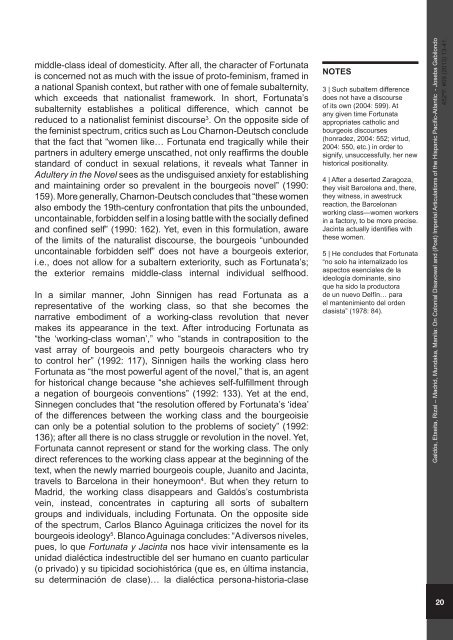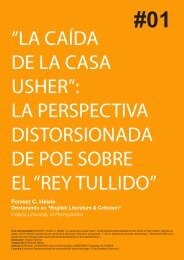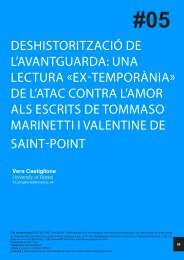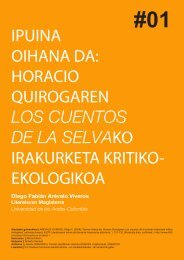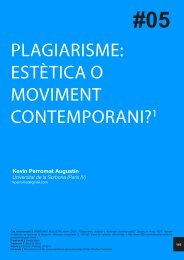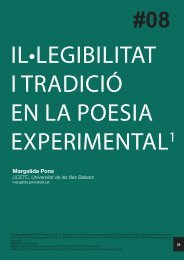middle-class ideal of domesticity. After all, the character of Fortunatais concerned not as much with the issue of proto-feminism, framed ina national Spanish context, but rather with one of female subalternity,which exceeds that nationalist framework. In short, Fortunata’ssubalternity establishes a political difference, which cannot bereduced to a nationalist feminist discourse 3 . On the opposite side ofthe feminist spectrum, critics such as Lou Charnon-Deutsch concludethat the fact that “women like… Fortunata end tragically while theirpartners in adultery emerge unscathed, not only reaffirms the doublestandard of conduct in sexual relations, it reveals what Tanner inAdultery in the Novel sees as the undisguised anxiety for establishingand maintaining order so prevalent in the bourgeois novel” (1990:159). More generally, Charnon-Deutsch concludes that “these womenalso embody the 19th-century confrontation that pits the unbounded,uncontainable, forbidden self in a losing battle with the socially definedand confined self” (1990: 162). Yet, even in this formulation, awareof the limits of the naturalist discourse, the bourgeois “unboundeduncontainable forbidden self” does not have a bourgeois exterior,i.e., does not allow for a subaltern exteriority, such as Fortunata’s;the exterior remains middle-class internal individual selfhood.In a similar manner, John Sinnigen has read Fortunata as arepresentative of the working class, so that she becomes thenarrative embodiment of a working-class revolution that nevermakes its appearance in the text. After introducing Fortunata as“the ‘working-class woman’,” who “stands in contraposition to thevast array of bourgeois and petty bourgeois characters who tryto control her” (1992: 117), Sinnigen hails the working class heroFortunata as “the most powerful agent of the novel,” that is, an agentfor historical change because “she achieves self-fulfillment througha negation of bourgeois conventions” (1992: 133). Yet at the end,Sinnegen concludes that “the resolution offered by Fortunata’s ‘idea’of the differences between the working class and the bourgeoisiecan only be a potential solution to the problems of society” (1992:136); after all there is no class struggle or revolution in the novel. Yet,Fortunata cannot represent or stand for the working class. The onlydirect references to the working class appear at the beginning of thetext, when the newly married bourgeois couple, Juanito and Jacinta,travels to Barcelona in their honeymoon 4 . But when they return toMadrid, the working class disappears and Galdós’s costumbristavein, instead, concentrates in capturing all sorts of subalterngroups and individuals, including Fortunata. On the opposite sideof the spectrum, Carlos Blanco Aguinaga criticizes the novel for itsbourgeois ideology 5 . Blanco Aguinaga concludes: “A diversos niveles,pues, lo que Fortunata y Jacinta nos hace vivir intensamente es launidad dialéctica indestructible del ser humano en cuanto particular(o privado) y su tipicidad sociohistórica (que es, en última instancia,su determinación de clase)… la dialéctica persona-historia-claseNOTES3 | Such subaltern differencedoes not have a discourseof its own (2004: 599). Atany given time Fortunataappropriates catholic andbourgeois discourses(honradez, 2004: 552; virtud,2004: 550, etc.) in order tosignify, unsuccessfully, her newhistorical positionality.4 | After a deserted Zaragoza,they visit Barcelona and, there,they witness, in awestruckreaction, the Barcelonanworking class—women workersin a factory, to be more precise.Jacinta actually identifies withthese women.5 | He concludes that Fortunata“no solo ha internalizado losaspectos esenciales de laideología dominante, sinoque ha sido la productorade un nuevo Delfín… parael mantenimiento del ordenclasista” (1978: 84).Galdós, Etxeita, Rizal – Madrid, Mundaka, Manila: On Colonial Disavowal and (Post) Imperial Articulations of the Hispanic Pacific-Atlantic - Joseba Gabilondo<strong>452ºF</strong>. #09 (2013) 13-41.20
corresponde rigurosamente a la dialéctica ficción-no ficción” (1978:92). Yet, Blanco Aguinaga does not establish the working class status ofFortunata and therefore she escapes “su determinación de clase” andultimately any traditional Marxist understanding of historical dialectics.Fortunata is elsewhere in the non-political space of subalternity 6 .Only Jo Labanyi, from a cultural-studies approach, encompassingboth Marxism and feminism, makes the nationalist function of thestate explicit in her analysis and, thus, points to the fact that thereare spaces and subject positions, which the State and its nationalistideology cannot control, but Galdós represents in his novels. As shestates: “[H]ere Galdós is not just criticizing marriage as an institution,but signaling the gap between sign and signified that occurs whenthe centralized nation-State attempts to subject all forms of privateas well as public life to legal codification” (2000: 207). When Labanyiconcludes that realism problematizes the relation between realityand representation by blurring them, thus bringing the reader’sattention to its unreliability, she does open a critical space to thinkgender and subalternity, although she does not elaborate it 7 . Ibelieve that, in this respect, an Atlantic-Pacific Hispanic approachcentered on colonial disavowal, in this respect, allows us to thinkthis non-bourgeois/non-class exteriority embodied by Fortunata.1.2 Fortunata and the RealA Lacanian reading of the imperialist/colonial dimensions of Fortunataand Jacinta might be helpful to impinge upon the specific nationalistand hegemonic articulations of the protagonist, Fortunata, the novelitself, and ultimately Spanish naturalism 8 . It is more productive ifFortunata’s position is not reduced to some positive and nationalistspace defined by either the presence or absence of proto-feministor working-class consciousness, and, instead, her position is keptin its irreducible and negative female subaltern nature. One couldtentatively assume that Fortunata stands for the other: in this case,the other of both Spanish and north European imperialism andnationalism. At the same time, and as it is the case with most subalternpositions that signify otherness, Fortunata contains an irreducibleand traumatic kernel that stands for the Real—the Real of a Spanish/European symbolic order. In the novel, Fortunata returns repeatedlyas the marker of a real and irreducible subaltern position that istraumatic to the Spanish naturalist order and the nationalist symbolicorder of Restoration Spain—hence her irrepresentable negativity.NOTES6 | In that respect, Fortunatais not even a prostitute, asseveral critics have suggested,for there is no capitalisttransaction and economy at thecore of her relationship with thedifferent men with whom shelives. Hers is a pre-capitalistway of survival—a subalternway of life.7 | “Realism problematizesthe relationship betweenrepresentation and reality,not—as in modernism—byinsisting on the differencebetween the two, but byblurring the boundary betweenthem while at the sametime making it clear thatrepresentation is unreliable.This, I would argue, is moredisturbing” (2000: 208).8 | Furthermore, the hystericaland emotional outbreaksexperienced by most malecharacters who encounterFortunata at the end—Maxiher husband, Ido de la Iglesia,Ballester the pharmacist—bearwitness to the power of thissubjective and epistemologicalshuttering provoked byFortunata. Even Juanito SantaCruz, Fortunata’s bourgeoislover, does not escape herdestructive effect: he is exiledby his wife, Jacinta, from theheart of the bourgeois house—the order to which he alwaysreturned after each excursionin Fortunata’s subaltern worldof darkness (2004: 647)—afterthe latter woman receives achild from the former.Galdós, Etxeita, Rizal – Madrid, Mundaka, Manila: On Colonial Disavowal and (Post) Imperial Articulations of the Hispanic Pacific-Atlantic - Joseba Gabilondo<strong>452ºF</strong>. #09 (2013) 13-41.If this initial hypothesis is accepted, then, it is more productive to traceall the signifiers and names that Galdós gathers around Fortunatain order to pinpoint, not her meaning, but rather the symbolic,historical, and political order that makes her position traumatic,negative, and irreducible. Once this analysis is performed, it appears21
- Page 1 and 2: 452ºF452ºF OriginalIssueVersióno
- Page 3 and 4: EDITORIAL en-452ºF Literaturaren T
- Page 5 and 6: EDITORIAL es-452ºF Revista de Teor
- Page 7 and 8: EDITORIAL ca-452ºF Revista de Teor
- Page 9 and 10: LAEDITORIA-eu-452ºF Literaturaren
- Page 11 and 12: 13 42 56JOSEBAGABILONDOGaldós, Etx
- Page 13 and 14: GALDÓS, ETXEITA,RIZAL - MADRID,MUN
- Page 15 and 16: The bullion [of silver coming from
- Page 17 and 18: Although Paul Gilroy’s disregard
- Page 19: Fortunata and Jacinta (1886-87), to
- Page 23 and 24: the bourgeoisie, so that the former
- Page 25 and 26: los decía con desdén a la clase m
- Page 27 and 28: café culture and Galdós’s natur
- Page 29 and 30: itself as nation-state or, in Blanc
- Page 31 and 32: disavowal at the core of their nove
- Page 33 and 34: force; the latter is always mention
- Page 35 and 36: the local chamber of commerce and f
- Page 37 and 38: century in a double colonial geogra
- Page 39 and 40: spaces of dominated nationalism suc
- Page 41 and 42: JUARISTI, J. (1997): El bucle melan
- Page 45 and 46: Euskal Herriko sasietako urretxindo
- Page 47 and 48: Bizkitartean non daude euskal nobel
- Page 49 and 50: XX. mendeko emakume euskaradunen li
- Page 51 and 52: Aukeratu ditugun emazte idazleen te
- Page 53 and 54: prozesu fisiologiko horretaz.Emakum
- Page 55 and 56: BibliografiaAGIRRE, Katixa (2009):
- Page 57 and 58: 452ºFLaburpena || Bere burua euska
- Page 59 and 60: apologisten pentsamendu mitologiko
- Page 61 and 62: dezakegu mende bat beranduago, Grat
- Page 63 and 64: deritzolako desiragarri begirada ko
- Page 65 and 66: abian jarriko duten idazleek Sabino
- Page 67 and 68: Txillardegik ETA erakundearen sorku
- Page 69 and 70: Halere, historiak, batzuetan totelk
- Page 71 and 72:
literarioa aniztu ahala- pixkanaka
- Page 73 and 74:
ondorio. Atxagari dagokionean, berr
- Page 75 and 76:
delako aspalditxotik, eta euskal po
- Page 77 and 78:
BibliografiaATXAGA, B. (1982): «Eu
- Page 79 and 80:
452ºFLaburpena || Artikulu honen x
- Page 81 and 82:
expresa por medio de enigmas y mist
- Page 84 and 85:
erezia» (Atxaga et al., 1975). Min
- Page 86 and 87:
poesía irrealista y evasiva, forma
- Page 88 and 89:
lotzeko nahia agertzen baita: «Mun
- Page 90:
du, hain zuzen, literatur historia
- Page 93 and 94:
kostaldeko iruditeria goibela hartz
- Page 95 and 96:
POESÍA CORPORAL/DANZA VERBAL:UNA L
- Page 97 and 98:
0. IntroducciónEn este trabajo vam
- Page 99 and 100:
Sarrionandia―).2. El imaginario p
- Page 101 and 102:
coreografía nos remite a la textua
- Page 103 and 104:
pero eso sí, los poemas se escucha
- Page 105 and 106:
y tienen voz. Ixiar Rozas (2011) en
- Page 107 and 108:
aile, una voz en off recita parte d
- Page 109 and 110:
iniciativas culturales de las compa
- Page 111 and 112:
POÉTICA DERESISTENCIAEN ITXAROBORD
- Page 113 and 114:
Itxaro Borda (pseudónimo de Bernar
- Page 115 and 116:
haber sentido de niña), permiten
- Page 117 and 118:
Percibía la paz.Sigo dando a verLo
- Page 119 and 120:
Poética de resistencia en Itxaro B
- Page 121 and 122:
ilingüe «Otsude nago», transferi
- Page 123 and 124:
BibliografíaAPALATEGI, U. (2008):
- Page 125 and 126:
normal en lenguas nacionales o inte
- Page 127 and 128:
452ºFLaburpena || Bakartasuna da I
- Page 129 and 130:
1. Zedarri zenbait1. 1. Bakartasuna
- Page 131 and 132:
Bakartasuna plurala eta paradoxikoa
- Page 133 and 134:
eta pertsonaien misantropia azaleko
- Page 135 and 136:
Walter Benjaminek -Benjamin, 1972:
- Page 137 and 138:
modu paradoxiko batean, (Euskal) ko
- Page 139 and 140:
BibliografiaItxaro Bordaren liburua
- Page 141 and 142:
Nouvelle Revue de Psychanalyse (198
- Page 143 and 144:
PERIFÉRICABLVD. O UNA(NEO)BARROCAP
- Page 145 and 146:
No deja de ser una comprobación de
- Page 147 and 148:
Puede decirse, así, que Periféric
- Page 149 and 150:
1. Un policial contra el policialCo
- Page 151 and 152:
-Che, campestre, ¿dónde te metes?
- Page 153 and 154:
tener, y si bien el lector tiende,
- Page 155 and 156:
de ciudad, diría Rama). Dos formas
- Page 157 and 158:
posible, representada e inventada,
- Page 159 and 160:
No puedo dejar de enfatizar, así,
- Page 161 and 162:
BibliografíaARECO, M. (2011): «Ca
- Page 163 and 164:
452ºFAbstract || It is a truth uni
- Page 165 and 166:
naturalistic or empiricist literary
- Page 167 and 168:
enemy in the 1984 TV series—with
- Page 169 and 170:
gain control. The most evident case
- Page 171 and 172:
ipped John’s mask off in front of
- Page 173 and 174:
Anna: Nothing’s too complex for o
- Page 175 and 176:
originally conceived as a prequel t
- Page 177 and 178:
as “made of lead,” is responsib
- Page 179 and 180:
other opening the casket is pivotal
- Page 181 and 182:
a case of mistaken identity. I’m
- Page 183 and 184:
GALLARDO, X. C. and SMITH, C. J. (2
- Page 185 and 186:
Mireia Martín
- Page 187 and 188:
Nuevas subjetividades/Sexualidades
- Page 189 and 190:
Islas imaginadasLuz C. Souto452ºF


